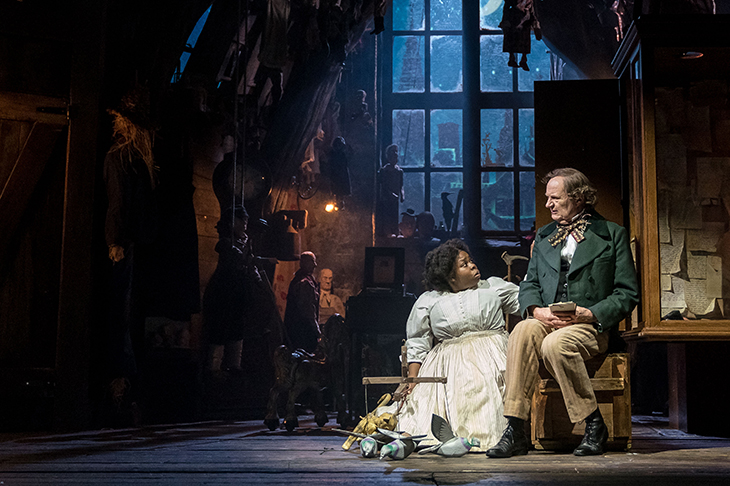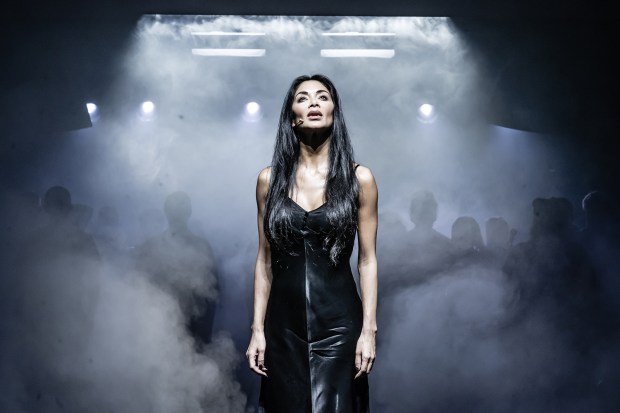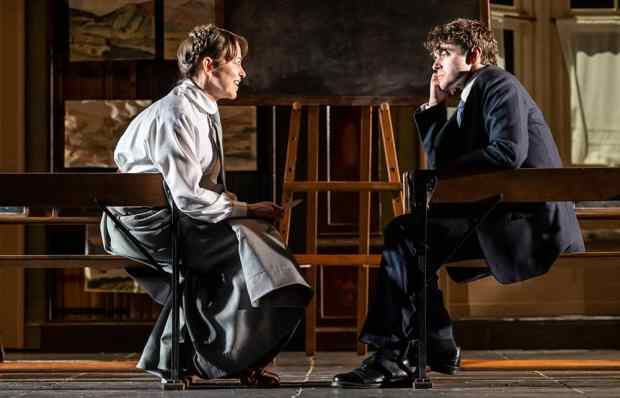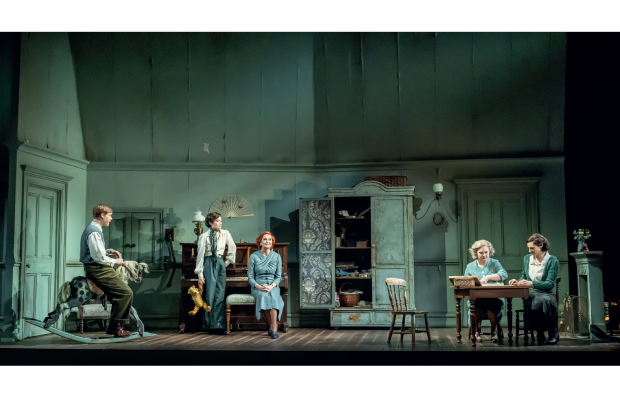In the year since it opened, the Bridge has given us the following: a harmless Karl Marx comedy by Richard Bean; a modern-dress Julius Caesar with Ben Whishaw playing Brutus as a frowning existentialist; a dreary rustic soap opera written by newcomer Barney Norris; and an enjoyable NHS romp by Alan Bennett. Not quite the string of triumphs everyone had expected from Nicholas Hytner who used to produce two dozen shows a year at the National but now manages one every three months at his bankside garret.
Time on his hands. But not enough to script-edit the efforts of fashionable wags like Martin McDonagh whose silly, mean-spirited skit about Hans Christian Andersen is a humiliating low point in the Bridge’s short history. The setting is Copenhagen. Hans Christian Andersen, played as a bumptious egomaniac by Jim Broadbent, nurtures a terrible secret. In a cage in his loft, he keeps a one-footed female pygmy (a dignified performance from Johnetta Eula’Mae Ackles) and he uses her folk memories as the source for his world-famous tales.
He also enjoys taunting her physical frailties. ‘You’re like a tinier Tiny Tim but African and not as amusing.’ This gag, which typifies the show’s level of humour, rests on two assumptions. First, the audience will consider a disabled child such as Tiny Tim funny. Second, they will regard another invalid as a less fertile source of mirth because she’s Congolese. These are very grating, puerile sentiments. Which of us believes, as McDonagh appears to, that every instance of human adversity, penury or impairment has been laid on by providence to keep us amused in our theatres?
The play moves to London where Hans Christian Andersen billets himself on Charles Dickens. Phil Daniels plays the novelist as a colourless grouch who can’t stop saying ‘fuck’, especially when Andersen mistakes him for Charles Darwin, as he does several times. The repetition of this gag is mirrored by another instance of replication when it emerges that Dickens, like Andersen, has secretly purloined all his stories from an African captive. At the heart of this muddled and idiotic play is an attempt to parrot the orthodoxy that the wealth of Europe is the plunder of a superior culture in Africa. Were McDonagh not a Hollywood bigwig, he would have struggled to find a home for this bleak, childish frivolity. On press night I was seated a few yards behind the author in a pew full of actors whose fruity cackles were obviously intended for his ears. And I had an unimpeded view of Phoebe Waller-Bridge, a fabulously gutsy comic writer, who laughed only sparingly at this. Brave of her. She’s the author’s girlfriend.
The Wild Duck at the Almeida is in the unsteady hands of Robert Icke. This lauded director regards himself as a theatrical seer who alone is capable of rendering non-English writers intelligible to the unlettered brutes who swarm London’s playhouses hoping to learn something of overseas drama. The show starts with a Scouse actor, Kevin Harvey, challenging those who clamour for ‘original Ibsen’. Are they seriously asking to see the script performed in the original Danish? Drama is about truth, he goes on. We don’t ‘say the truth’, we ‘tell the truth’, he explains, so the truth is ‘a tale’, not an objective fact. Gosh. The primary school waffle continues for several minutes, and it includes this priceless addition to the inventory of western art. ‘The stories we tell, tell us who we are.’
The play begins and Ibsen’s delicate tapestry of betrayal and dishonour collapses in a tangle of absurdities. An English family, curiously named Ekdal, are running out of cash because James Ekdal, the dad, has invested his cash in the near-extinct trade of photographic portraiture. Why is he such a fool? And why is he convinced that his father’s spell in jail has ruined his reputation for ever? And why is no doctor attempting to treat young Hedwig’s progressive eye disease? And why is Grandpa Francis stumbling around the house with a loaded gun? This puzzling character (sweetly played by Nicholas Farrell) is a dotty old alcoholic who keeps a warren of rabbits in the attic. Every night he dodders up the stairs and executes a bunny for the pot using a firearm issued legally, it would appear, even though he’s a dipsomaniac with a prison record who lives in the same house as a child who is going blind. Out-and-out barminess.
Ibsen gets more of a look-in the second half and even Icke can’t spoil the narrative intricacies of the closing scenes. These sudden reversals are so beautifully planted and so artfully disclosed that I was left gasping, almost audibly, in admiration. As I left the theatre I vowed to see The Wild Duck again, as soon as possible, but with Ibsen and not a pompous vandal in charge.
Got something to add? Join the discussion and comment below.
Get 10 issues for just $10
Subscribe to The Spectator Australia today for the next 10 magazine issues, plus full online access, for just $10.
You might disagree with half of it, but you’ll enjoy reading all of it. Try your first month for free, then just $2 a week for the remainder of your first year.














Comments
Don't miss out
Join the conversation with other Spectator Australia readers. Subscribe to leave a comment.
SUBSCRIBEAlready a subscriber? Log in